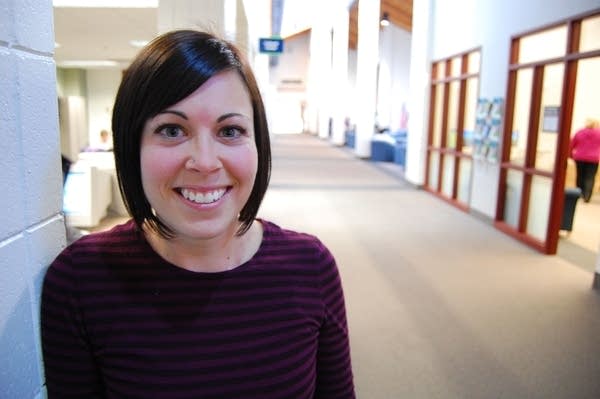Minnesota colleges making efforts to prevent dropouts
Go Deeper.
Create an account or log in to save stories.
Like this?
Thanks for liking this story! We have added it to a list of your favorite stories.

In a new effort to keep students in school, Minnesota colleges are reaching out to students who face academic or financial challenges before those problems force them to drop out.
Helping students complete their degree is not only part of the mission of a college, but it also makes economic sense.
Renee Guenther, 27, admits she wasn't a dedicated student when she started college nine years ago.
"I didn't study, I didn't do homework," Guenther said. "By the end of the school year, I had failed an entire semester's worth of credits."
Turn Up Your Support
MPR News helps you turn down the noise and build shared understanding. Turn up your support for this public resource and keep trusted journalism accessible to all.
Guenther dropped out after one year of community college. Even though she was struggling, she said she never heard from an advisor or an instructor.
"I wouldn't show up for class for two or three weeks," she said. "Then I would show up to take a final test and I was still able to take a test. I don't feel like there was any intervention going on there."
These days, Guenther is much more studious. She's now studying biology at Inver Hills Community College in Inver Grove Heights, and she sees a big difference in how this college is helping her be a better student. She's taking a course that teaches good study habits and time-management skills. She said feels comfortable approaching instructors with her concerns.

"I feel like my teachers are more involved," she said. "I feel like people really care and people want you to be here."
Officials at Inver Hills Community College say students who feel that way are less likely to drop out.
Barbara Read, the college's vice president for student affairs and enrollment, said instructors and staff at Minnesota colleges are reaching out to students more than they once did to offer academic help or answer financial aid questions.
"Even a few connections to a college employee, a faculty or a staff member, can make a tremendous difference if a student is going through a difficult period or don't know if they will be able to continue," Read said.
If colleges want to reach out to students who need help, college officials need to know which students are having trouble.
Linda Baer is senior vice chancellor at the Minnesota State Colleges and Universities system, and she said MnSCU is currently investigating new ways to monitor student progress.
"What we're looking for are the leading indicators that help up understand when warning flags come up and say 'You're in trouble. You haven't been in class, you haven't logged on, you haven't shown us the engagement that's important,'" Baer said. "Catch them before they just go home."
Colleges are feeling pressure to help more students graduate. President Obama and national educational officials say more college graduates are needed to ensure the country's future economic vitality.
Retention is also a matter of money for colleges. As state funding for higher education has decreased, colleges rely more on revenue from tuition dollars. Students who drop out take that revenue with them.
Bob McMaster, vice provost and dean of undergraduate education at the University of Minnesota, said there's another economic reason for the focus on student retention.
"We make a tremendous investment in that student," McMaster said. "In recruiting that student, in bringing them here, getting them through the first year; and so we want to make sure we keep that investment at the University for four years and graduate the student in that time."
The University of Minnesota is putting extra effort into keeping students on track and in school.
For the first time last summer, U of M admissions counselors called students who started at the U as freshmen, but didn't enroll as sophomores, to try to get them to come back to school.
McMaster said the U also has new software in place in the college of liberal arts that raises a red flag when students drop a class.
"The adviser learns about this within about one hour," he said. "The adviser will be on the phone, this could happen at any point in the year, with the student saying 'Why did you drop that class? You're not going to graduate on time unless you get back here and enroll'."
If students are having trouble academically, McMaster said the U connects them with a tutor. If money is the problem, he said they help students look for options through financial aid.
The U was recently rated near the bottom of Big 10 colleges in terms of retention. University officials say this year their freshman to sophomore retention rate has improved, and the next time those ratings come out they hope to be in the middle of the Big 10 pack.




